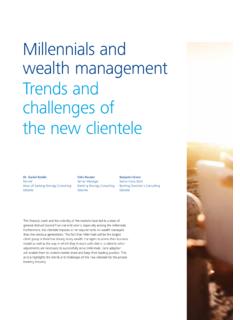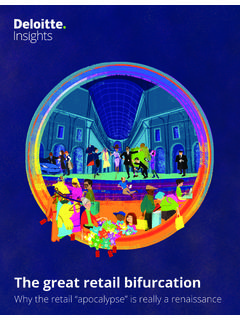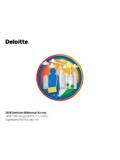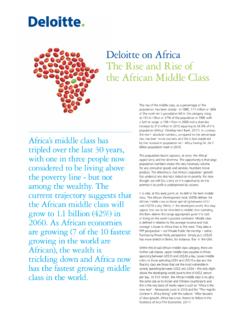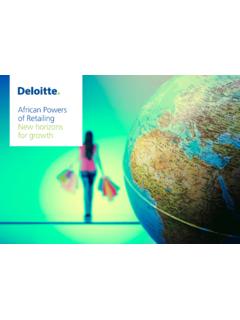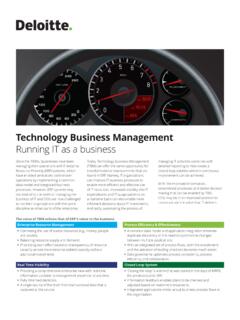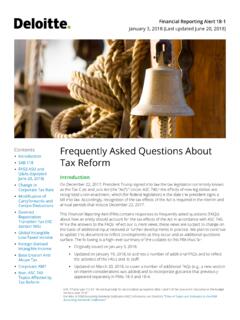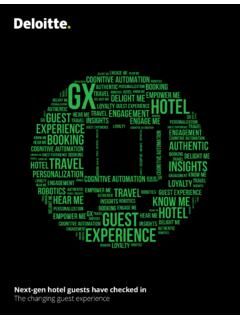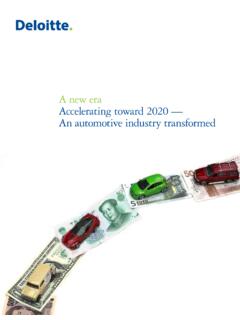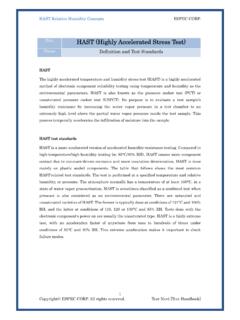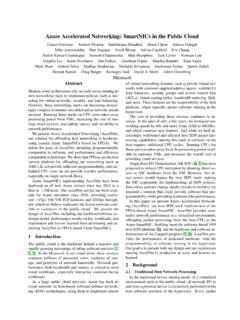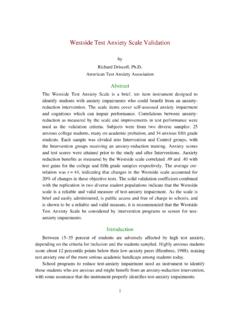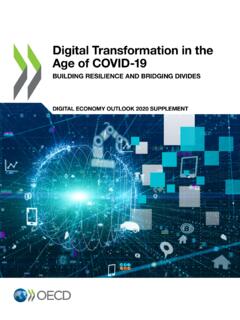Transcription of The future of hospitality - Deloitte
1 The future of hospitalityUncovering opportunities to recover and thrive in the new normalThis page has been intentionally left future of hospitality | Table of contents Table of contentsIntroduction 3 The pandemic is driving changes to customer behaviour 4 Responding to the challenges, seizing the opportunities 6 Trust will be essential 7 Reimagine the customer experience for a COVID-19 world 8 Focus on operational agility to navigate uncertainty 13 Considerations for employee and customer health and safety 16 Considerations for effective business recovery 18A recovery like no other 20 This page has been intentionally left future of hospitality3 The future of hospitality | IntroductionIntroductionThe global hospitality sector has been hit hard by the COVID-19 crisis.
2 Restaurants, hotels, casinos, and sporting venues have stood empty for months as governments and public health authorities acted to contain the spread of the coronavirus. These organizations moved swiftly to mitigate the impact on their business, furloughing staff, reducing costs, pivoting online, and more, until given the green light to reopen. Now that time has come. Authorities across Canada and other parts of the world have begun to reopen their economies, and the hospitality sector is gearing up to open their doors once again. Yet the world in which the industry now finds itself has changed. The COVID-19 pandemic and the resulting global lockdown have dramatically affected consumer behaviour.
3 Some behavioural changes in motion before the outbreak have accelerated ; others have slowed or stopped. New habits and expectations have arisen. Discretionary spending has suffered, and spending patterns have changed. Understanding and responding to consumers changing behaviours will be essential to the recovery of the hospitality sector. Organizations will need to reimagine the customer experience and re-engage with customers to build and maintain their trust. At the same time, they will need to improve their operational agility and financial resilience to navigate the uncertainties of doing business in a world wracked by this report, Deloitte explores some of the ways the COVID-19 crisis has changed consumer behaviours and what this could mean for the hospitality sector.
4 We also look at opportunities that can enable restaurants, hotels, casinos, sports organizations, and other hospitality organizations to adjust to our new normal, recover, and thrive once future of hospitality | The pandemic is driving changes to customer behaviour0% 10% 20% 30% 40% 50% 60% 70% 80% 90% 100%The pandemic is driving changes to customer behaviourThe COVID-19 crisis upended our daily lives at dizzying speed. Travel screeched to a halt. Schools, stores, restaurants, and entertainment venues shut. Sports leagues suspended their seasons. Hotels emptied. And billions of people found themselves under lockdown, working from home or suddenly out of work. Months of self-isolation and, in many cases, significant spending constraints quickly and dramatically changed how consumers behave.
5 And in the absence of a vaccine for the novel coronavirus and in a world facing ongoing economic pressures the Organization for Economic Co-operation and Development (OECD) forecasts that the global economy will contract 6 percent this year1 many of these behavioural changes are likely to endure. Consumers reduce and redirect discretionary spendingIt s normal for people to reduce discretionary spending in times of social or economic uncertainty. The COVID-19 crisis also seems to have prompted consumers to re-evaluate their overall spending priorities: many pre-pandemic must-haves are now seen as nice-to-haves at best. According to Deloitte s State of the Consumer Tracker, which is measuring global consumer sentiment during the pandemic, Canadian consumers expect to spend 20 percent less on discretionary items in the next four weeks than they did in the previous four weeks.
6 They expect to spend 51 percent less on travel, 15 percent less on restaurants and takeout, and 14 percent less on entertainment over the same period. In contrast, consumers expect to spend 29 percent more on groceries and 16 percent more on internet and mobile These trends indicate it will still be quite some time before the hospitality sector returns to business as usual, and those businesses that depend on travel and tourism are likely to face deeper challenges. Business travel, long a key driver of hospitality sector revenues, will also take time to recover, though estimates range from the end of 2020 to two or three years from now. Some portion of business travel perhaps 5 to 10 percent may not return at all because the companies that once paid for that travel may hospitality organizations will want to stay on top of business travel trends and adjust their business planning accordingly.
7 Canadians intend to use digital to meet many needs: Streaming entertainment57%Videoconferencing with family52%Using payment apps/services52%Virtual reality meet-ups27%Virtual exercise programs22%Source: Deloitte , Global State of the Consumer Tracker, Canada, June 27, 20205 The future of hospitality | The pandemic is driving changes to customer behaviourConsumers embrace of digital acceleratesCOVID-19 lockdowns have seen Canadians work, shop, socialize, and entertain themselves online more than ever; some for the very first time. This is likely to not only increase their comfort with digital technologies and experiences, but their appetite for them as well. As provinces ease restrictions, many Canadians will remain concerned about exposure to the coronavirus and will be open to new technologies such as self-check-ins and check-outs, touchless payments, app-based services, augmented or virtual reality, and more.
8 For hospitality organizations, this should be seen as an invitation to innovate and invest in digital technology. Consumers may be slow to return to old habits and crowdsCanadians are undoubtedly pleased to see governments take the first steps toward reopening the economy in the new normal. But the hospitality sector shouldn t expect a swift return to full houses, Las Vegas huge reopening crowds For one thing, authorities are likely to maintain strict, if evolving, rules on venue capacity, physical distancing, and more in an effort to ensure that reopening doesn t spark a new wave of viral infections. But consumers themselves may be reluctant to return to their old habits. Nearly half (47 percent) of Canadians are concerned about their own physical well being, and 58 percent are concerned about the health of their family.
9 Only 15 percent of Canadian consumers say they feel safe attending in-person events; 34 percent feel safe going to a restaurant, and 29 percent feel safe staying in a Canadian consumers may want to go out for dinner, a night at the casino, or a sports event but many still don t believe it s safe to do so. To persuade consumers to return, the hospitality sector must ensure it delivers a clean, safe experience and effectively communicate this to consumers. Travel? What travel?Border closures and travel restrictions brought global travel and tourism to a virtual standstill, devastating airlines, cruise ship operators, hotels, casinos, and tourism-related businesses worldwide. After the S&P 500 reached a new high in mid-February 2020, the market capitalization of the so-called BEACH sector booking, entertainment, airlines, cruises, and hotels dropped CAD $450 billion within a There are signs of recovery, with cruise line bookings up significantly from the same time last year and a potential return to the seas in late summer or early fall.
10 This example illustrates what is likely pent-up demand for experiences and fun after the prolonged lockdown, and may translate into rapid re-engagement across the sector travel restrictions are beginning to ease in parts of the world, it could still take two to three years for the travel and tourism sector to regain its former strength. Canadian consumers say they expect to spend much less (45 percent less) on travel in the weeks ahead,7 and with Canadian travel restrictions remaining in place, it seems unlikely that spending will rise much in the months to come. In the near term, Canadian consumers are likely to stay close to home, visiting destinations within easy driving distance such as cottages, where authorities allow it.
